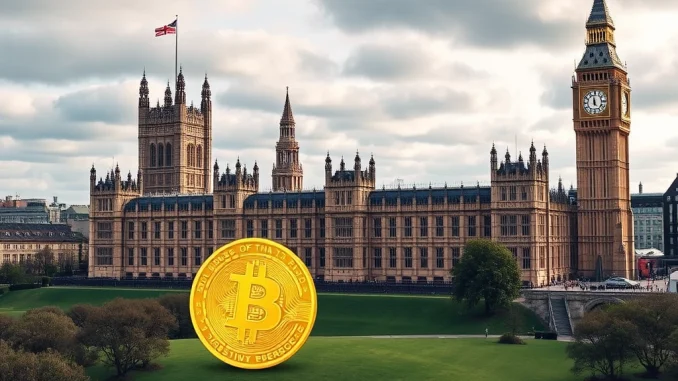
For anyone following the intersection of traditional finance and the burgeoning world of digital assets, news regarding official government stances on cryptocurrency is always significant. The latest update from the UK provides a clear signal: don’t expect the UK to build UK Bitcoin reserves anytime soon.
Why is Bitcoin Volatility a Dealbreaker?
UK Member of Parliament Emma Reynolds recently confirmed the British government’s position. According to reports, the UK does not intend to incorporate Bitcoin into its strategic reserves. The primary reason? The cryptocurrency’s notorious volatility.
Foreign exchange reserves are managed with a core set of principles in mind, prioritizing stability, liquidity, and reliability as a store of value. These reserves are crucial for a nation’s economic security, used to manage currency exchange rates, maintain market confidence, and act as a buffer during economic shocks.
The high degree of price fluctuation inherent in Bitcoin is seen as fundamentally incompatible with these objectives. A reserve asset needs predictability and stability, characteristics that Bitcoin, while offering potential long-term growth, currently lacks from a traditional reserve management perspective.
Understanding Government Bitcoin Holdings
The idea of a government holding Bitcoin isn’t entirely unprecedented. El Salvador famously adopted Bitcoin as legal tender and holds it on its balance sheet. However, this remains an outlier globally. Most nations have approached the idea with extreme caution, if they’ve considered it at all.
Here’s a simple comparison of what reserve managers typically look for versus Bitcoin’s current profile:
| Feature | Traditional Reserve Assets (e.g., USD, Gold) | Bitcoin |
|---|---|---|
| Stability | Relatively Stable, Predictable | High Price Volatility |
| Liquidity | Deep, Established Markets | High, but Market Depth Varies |
| Store of Value | Proven Over Long Periods | Potential, but Unproven Long-Term Stability |
| Regulation | Clear, Global Frameworks | Evolving, Fragmented |
| Purpose | Economic Stability, Currency Management | Decentralized Digital Asset |
For reserve managers whose mandate is primarily capital preservation and stability, the speculative nature and significant price swings of Bitcoin present an unacceptable risk.
What Does This Reveal About UK Crypto Policy?
The UK’s stance on UK Bitcoin reserves aligns with its broader, generally cautious approach to regulating the cryptocurrency market. While the government has expressed interest in making the UK a hub for crypto technology and innovation, this enthusiasm is tempered by a strong focus on financial stability and consumer protection.
Recent consultations and proposed regulations indicate a desire to integrate crypto activities into existing financial regulatory frameworks, rather than creating a completely separate system. This measured approach seeks to harness potential benefits while mitigating risks associated with market volatility, illicit finance, and consumer harm.
Ensuring UK Financial Stability in a Digital Age
At the heart of the decision to rule out Bitcoin reserves is the government’s commitment to maintaining UK financial stability. Including a highly volatile asset in the national reserves could introduce significant uncertainty and risk to the country’s financial standing. It could potentially complicate efforts to manage the economy, respond to crises, and maintain confidence in the pound sterling.
While the crypto market continues to mature, policymakers in major economies like the UK remain hesitant to integrate assets with such unpredictable price movements into the core pillars of their financial architecture. The focus remains on understanding the technology, regulating market participants, and exploring potential applications like central bank digital currencies (CBDCs), which offer more centralized control and stability compared to decentralized cryptocurrencies like Bitcoin.
In Summary
The confirmation from MP Emma Reynolds that the UK has no plans for UK Bitcoin reserves due to Bitcoin volatility reinforces the nation’s cautious approach to digital assets within its core financial operations. This decision reflects a priority on stability and risk management, key principles for maintaining UK financial stability. While the UK government explores various aspects of the crypto landscape and develops its overall UK crypto policy, integrating assets like Bitcoin into strategic national reserves appears firmly off the table for the foreseeable future, highlighting the current official view on government Bitcoin holdings.



